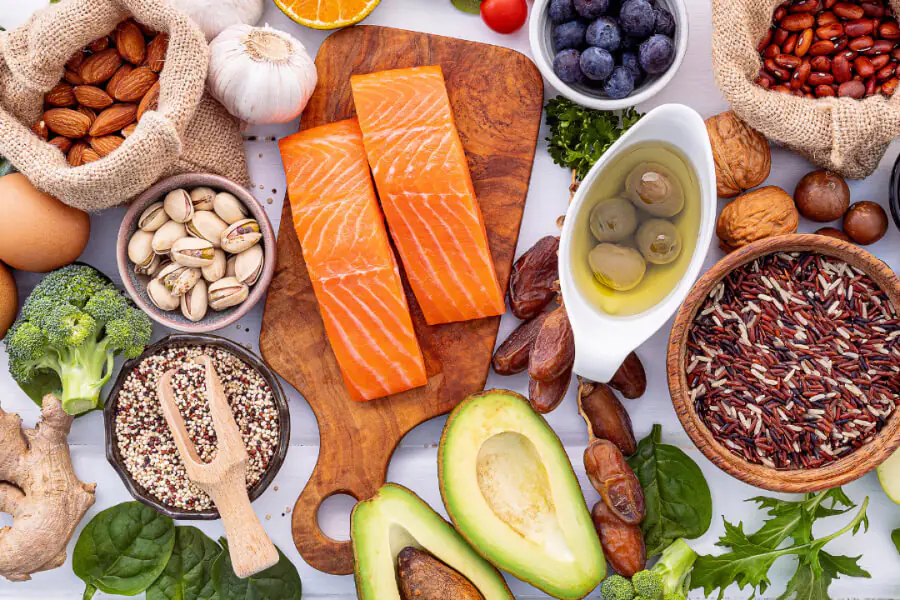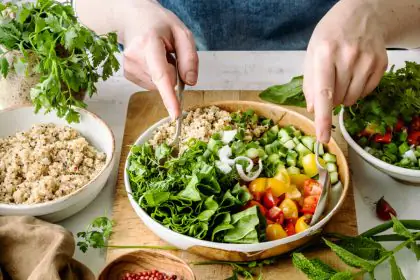Premenstrual Syndrome (PMS) is a common condition that affects many women, leading to a variety of physical and emotional symptoms.
If you’ve ever experienced bloating, mood swings, or fatigue before your period, you’re not alone. What’s more, diet and PMS are closely connected what you eat can significantly influence the severity of your symptoms.
How diet and PMS are linked? Let’s see while highlighting foods that can help reduce symptoms and those that may make them worse.
PMS: Symptoms and Impact on Daily Life
To better understand how diet and PMS intersect, let’s first explore what PMS is and how it impacts daily life.
Defining Premenstrual Syndrome and Its Symptoms
PMS refers to a group of symptoms that typically occur in the second half of the menstrual cycle, around 1-2 weeks before your period starts. Common symptoms include:
- Mood swings
- Fatigue
- Bloating
- Headaches
- Cramps
These symptoms can have a significant impact on your day-to-day life. Whether it’s struggling to stay productive at work or enduring physical discomfort, PMS can feel overwhelming. Thankfully, diet and PMS are linked, and certain foods can help ease some of these symptoms.
How PMS Affects Quality of Life and Well-being
For many women, PMS isn’t just an inconvenience it can affect both their emotional and physical well-being.
Understanding how diet and PMS are related and how dietary choices can support hormone balance is a key step in managing these symptoms more effectively.
The Role of Nutrition in Hormonal Balance
Hormonal fluctuations are at the root of PMS symptoms, and your diet and PMS are interlinked because the foods you consume can influence these hormones.
Certain nutrients help regulate hormonal balance, while others may exacerbate the problem. By improving your diet and PMS-related eating habits, you can reduce the intensity of your symptoms.
The Connection Between Nutrient Deficiency and PMS Symptoms
Low levels of specific nutrients, such as magnesium, vitamin B6, and calcium, have been shown to worsen PMS symptoms.
This makes it clear that diet and PMS management are vital when it comes to reducing the severity of symptoms. Ensuring adequate intake of these nutrients can make a noticeable difference in how you feel.
Key Nutrients to Reduce PMS Symptoms
Let’s discover the most essential nutrients for reducing PMS symptoms through diet and PMS-specific food choices.
Magnesium: Its Role in Reducing PMS Symptoms
Magnesium is an important mineral when it comes to managing PMS. It plays a role in muscle relaxation, which can help reduce cramps and improve mood.
A deficiency in magnesium can lead to more severe PMS symptoms, so adding magnesium-rich foods to your diet and PMS management plan is beneficial. Some foods high in magnesium include:
- Leafy greens (spinach, kale)
- Nuts and seeds (almonds, sunflower seeds)
- Whole grains (brown rice, quinoa)
Vitamin B6: Balancing Mood and Reducing Irritability
Vitamin B6 is essential for serotonin production, the hormone that helps regulate mood. Ensuring that your diet and PMS strategy include enough vitamin B6 can help keep your mood stable and reduce irritability. Foods rich in vitamin B6 include:
- Bananas
- Chickpeas
- Poultry (chicken, turkey)
Omega-3 Fatty Acids: Easing Inflammation and Supporting Mood
Omega-3 fatty acids are essential for reducing inflammation and improving mood, both of which can reduce PMS symptoms.
By including omega-3-rich foods in your diet and PMS management, you can experience fewer cramps and better emotional balance. Omega-3-rich foods include:
- Fatty fish (salmon, sardines)
- Chia seeds
- Walnuts
Calcium: Supporting Muscle Health and Reducing Cramps
Calcium is vital for regulating muscle contractions, which can help ease cramps. Women with PMS often report fewer symptoms when they consume adequate amounts of calcium, so it’s important to include calcium-rich foods in your diet and PMS regimen.
Dairy products like milk, cheese, and yogurt are excellent sources of calcium, as are leafy greens such as kale.
Foods That Worsen PMS Symptoms
Now that we know how diet and PMS are positively connected, let’s explore the foods that could worsen symptoms. By reducing or eliminating these foods from your diet, you can help improve your PMS experience.
The Impact of Processed Foods and Sugar on PMS
Refined sugars and processed foods can trigger blood sugar fluctuations, leading to mood swings and irritability common symptoms of PMS.
Additionally, these foods can increase inflammation in the body, worsening PMS cramps. When managing your diet and PMS, it’s important to limit foods such as:
- Processed snacks (chips, cookies)
- Sugary drinks (sodas, sweetened coffees)
Instead, focus on whole, unprocessed foods that can stabilize blood sugar levels and reduce inflammation.
Caffeine, Alcohol, and PMS: Understanding the Connection
Caffeine and alcohol can both aggravate PMS symptoms. Caffeine increases anxiety, disrupts sleep, and can make mood swings worse, while alcohol may contribute to dehydration and bloating.
For a more balanced diet and PMS approach, it’s advisable to reduce your intake of caffeine and alcohol, particularly in the week before your period.
High Sodium Intake and Its Effect on Water Retention
Excessive sodium intake can contribute to water retention and bloating, common PMS symptoms.
Since many processed foods are high in sodium, limiting these foods can help reduce bloating and discomfort.
For better diet and PMS management, go for fresh, unprocessed foods that naturally contain less sodium.
Practical Dietary Tips for Managing PMS Naturally
Now that we’ve examined the foods that can help and harm, let’s look at some practical tips to manage PMS naturally through diet and PMS-friendly strategies.
Meal Planning for Hormonal Balance
Planning your meals ahead of time can ensure that you’re getting the necessary nutrients to support hormonal balance.
For effective diet and PMS management, aim for a balanced plate that includes protein, healthy fats, and plenty of fruits and vegetables.
Hydration: The Importance of Water and Herbal Teas
Staying hydrated is important for managing PMS symptoms like bloating and fatigue. Drinking water and herbal teas, such as chamomile or ginger tea, can help soothe PMS symptoms. Hydration is an essential part of a diet and PMS plan.
Mindful Eating Practices
Mindful eating helps reduce stress and emotional eating, which can aggravate PMS symptoms. By focusing on your meals and eating slowly, you can help your body digest food more efficiently, reducing symptoms like bloating and cramps. Practicing mindfulness while eating is a helpful technique to add to your diet and PMS routine.
Conclusion
Your diet and PMS are intimately connected, and by making smart food choices, you can significantly reduce the severity of your symptoms.
With the right nutrients, a balanced approach, and a mindful eating strategy, you can improve your PMS experience. Start adding these dietary tips into your routine and take control of your well-being.
FAQs
What nutrient deficiency causes PMS?
Magnesium, vitamin B6, and calcium deficiencies are often linked to more severe PMS symptoms.
Why is PMS ruining my diet?
Hormonal fluctuations during PMS can trigger cravings and disrupt your regular eating habits.
Why is my PMS suddenly so bad?
Stress, lifestyle changes, and hormonal imbalances can exacerbate PMS symptoms over time.
Does losing weight help PMS?
Maintaining a healthy weight may help regulate hormones, but focusing on a well-rounded lifestyle, including a balanced diet and PMS-friendly foods, is key.







